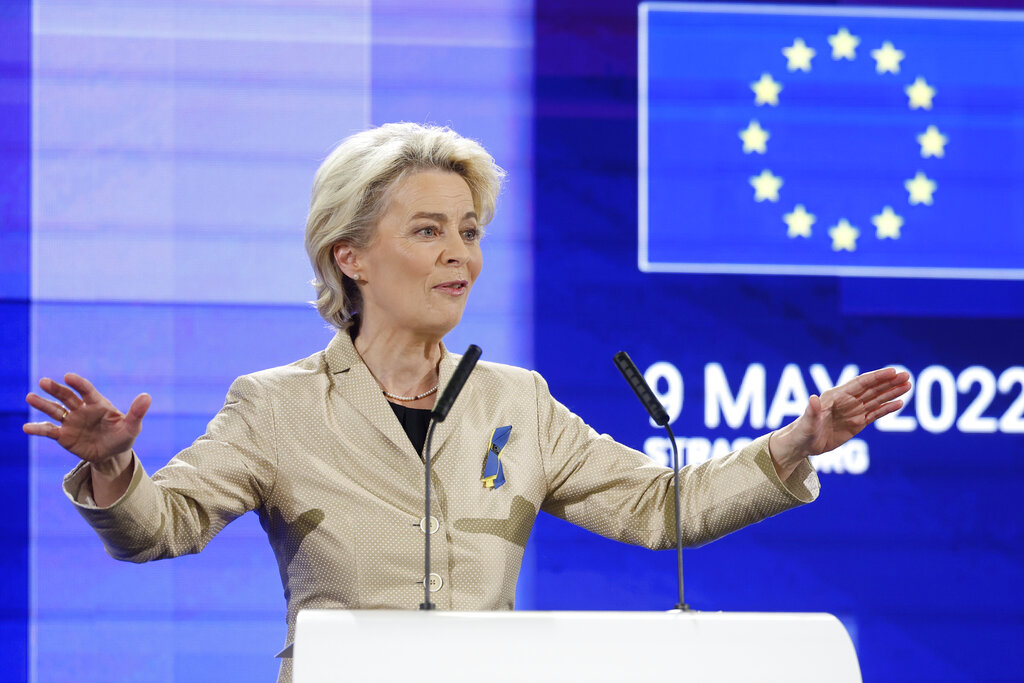European Commission President Ursula von der Leyen’s call to change the EU treaties, a move that would centralize power in Brussels, has been rejected by Polish conservatives and a total of 13 member states.
She made the proposal during a summit of EU leaders in Strasbourg, where one of the key reforms she put forward is the removal of the need for unanimity in decision-making on foreign affairs — in other words, the removal of veto power from individual member states.
“If the EU is to work effectively the principle of unanimity makes no sense in key EU policy areas,” argued von der Leyen.
If such a proposal were to come to pass, then countries like Hungary, Czechia, and Austria would be potentially unable to veto the EU’s highly controversial proposal to place an embargo on Russian oil, a sanction that many experts have warned could crash the European economy.
[pp id=35728]
The commission president’s proposal is being backed by the two most powerful nations of France and Germany, currently run by left-wing governments. Von der Leyen also hails from Germany, and like many left-liberal politicians, has long sought to limit the power of countries like Poland and Hungary which have blocked an agenda of mass immigration, progressive LGBT ideologies, and undemocratic reforms proposed by the EU which would limit national sovereignty.
“For us as a federal government, it is important that we reduce the power of veto making, which would allow the union to do much more,” said German Minister for Europe and Climate Anna Luhrmann.
French President Emmanuel Macron has also thrown his support behind transforming the EU treaties away from their founding principles.
“We need to reform our texts, it’s obvious,” Macron told a meeting at the European Parliament on May 9.
13 member states oppose treaty changes
However, such a move is being met with strong resistance from a variety of countries, and not just conservative-led ones.
“We do not support unconsidered and premature attempts to launch a process towards treaty change,” read a text signed by Bulgaria, the Czech Republic, Estonia, Denmark, Latvia, Finland, Lithuania, Malta, Slovenia, and Sweden. In total, 13 countries have now come out against the proposed treaty change.
Polish Justice Minister Zbigniew Ziobro wrote on social media that “Berlin wants to rule Europe” and wishes to subjugate other EU member states. He was adamant that his political grouping Solidarity Poland, which is part of Poland’s ruling United Right coalition, would never accept a proposal that would give the European Commission so much power, according to Polish news outlet Dorzeczy.pl.
“It’s so simple and predictable. First we get the conditionality mechanism to break unruly countries. And now you remove their voting rights. Berlin wants to rule Europe and the rest of us are to listen and fall into line. We will never accept this,” Minister Ziobro posted on Twitter.
Ziobro’s reference to the conditionality mechanism refers to what Hungary and Poland both see as a radical power grab by Brussels, which has recently allowed the EU to freeze funding to Hungary and Poland over vaguely defined “rule-of-law” issues. Hungary, for example, has restricted the teaching of LGBT topics to children in school, arguing that sexuality beyond the basics of sexual education needs to stay out of the classroom, especially for younger children. The liberal establishment in Brussels is completely at odds with this position and is using the EU’s purse strings to pressure Hungary into changing the policy of its democratically elected government.
Ziobro has in the last few days been emphasizing that he and his grouping were right to oppose agreeing to the conditionality mechanism by which EU funds can be stopped for non-compliance with European Commission strictures on the rule of law. He has always argued that this mechanism would be used to blackmail Poland.
Ziobro, as well as the larger Law and Justice (PiS), are both opposed to the federalization of Europe and the abolishment of national sovreignty.





